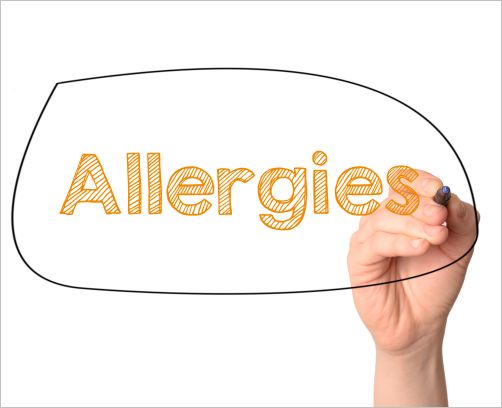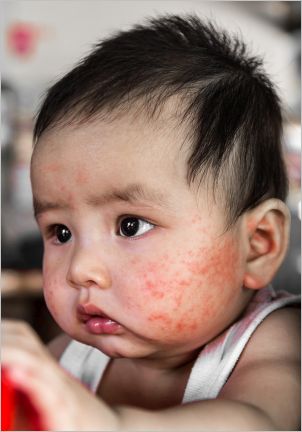Toddler Allergies
Toddler allergies happen when your little one’s immune system over-reacts to something in his environment—something in the air he breathes, in the things he touches, or in the food he eats. We call this trigger substance the allergen. Although the allergen, whatever it is, is perfectly harmless, your child’s body has labeled it as a threat. When your toddler comes in contact with this allergen his body goes into warfare mode, producing antibodies which go on to produce histamines. Your child’s body is doing everything possible to fight against something that isn’t even harmful, and it’s making your little boy or girl miserable as it does so.

Signs of Toddler Allergies
How can you tell your toddler is having an allergic reaction? Most allergic reactions happen pretty much immediately after your child has been in contact with the allergen. If the allergy is to something in the air, like mold or pollen, you may notice your child has:
• Red, watery, itchy eyes
• Runny nose
• Difficulty breathing or wheezing
These sound like the symptoms of the common cold, so how do you know it’s an allergy? By keeping track of when these symptoms happen, and how long they stick around. Colds usually last for over a day and less than seven; they begin, progress, and end in a fairly predictable manner. Allergies, on the other hand, can much more short-lived or last much longer.
If your toddler is mildly allergic to something outside, for instance, you may notice she has red, itchy eyes and sneezes whenever she is outside—or whenever she is outside by the flower garden—but is perfectly fine as soon as she comes in the house. Or if she is allergic to something indoors or to a more pervasive airborne pollen, you may notice she seems to have a runny nose all the time. Both these ‘gone and back again’ and long sticking around behaviors are reasons to believe your child’s sneezing, red eyes, or runny nose are something other than a cold.
If your child is allergic to something he wears or touches, you may notice a skin rash or hives. Food allergies also tend to cause skin rashes or hives, and may also cause your child’s lips and eyes to swell, his mouth to itch, or his eyes and nose to itch or water. This ‘stomach warfare’ can also lead to throwing up or diarrhea.
More rarely, allergic reactions can be severe, whole-body reactions that include difficulty breathing and can be life threatening. If your child has this type of allergy you’ll need to have fast-working antihistamines always available. Most allergies, however, are simply a nuisance.
Diagnosing Toddler Allergies

If you suspect your toddler has allergies you should talk to your pediatrician about running a skin-prick test. This is a test where your child’s skin is put in contact with small amounts of various allergens, and then the skin is pricked—just barely, so it doesn’t hurt much. If there are toddler allergies to the substance, the area right around that pricked spot will get red and itchy. It’s uncomfortable, but it doesn’t hurt much. There are also blood tests that can be run; if you choose this route, a sample of your toddler’s blood would be drawn and then sent to a lab for analysis.
Milk allergies and other delayed allergic reactions don’t show up well in these tests, and so they are more difficult to diagnose.
Treating Your Toddler’s Allergies
The best ‘treatment’ for allergies is avoiding the allergen. Give your toddler’s body the break it needs from this warfare by keeping away things that trigger it. If your child is allergic to a particular food, keep that food out of your kitchen. If he is allergic to mold, work on ridding your house of dark damp moisture and mold spots.
Sometimes there’s nothing you can do to avoid the allergen. Maybe your child is allergic to tree pollen; but it’s in all the air you breathe. Maybe there’s no way you can get all the mold out of your house. If your toddler is in unavoidable contact with allergens and it is making his life miserable, you should talk to your pediatrician about giving him antihistamines—medicines that work to mute the body’s histamine response.
Antihistamine medicines can also be an important back-up for those times when your toddler comes in contact with something he is allergic to by accident. Suppose he is allergic to pistachios, for instance, and he picks one up at party and puts it in his mouth before you notice and stop it. Over the counter antihistamines for children are available in all pharmacies.
Be aware that toddler allergies are often outgrown, so just because your child’s body can’t handle something now doesn’t mean he’ll never be able to enjoy it. Take it day by day, and work to make life with toddler allergies as pleasant and histamine-free as possible for your child now.
Click here to return from Toddler Allergies to Child Health
New! Comments
Have your say about what you just read! Leave me a comment in the box below.